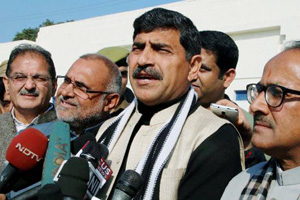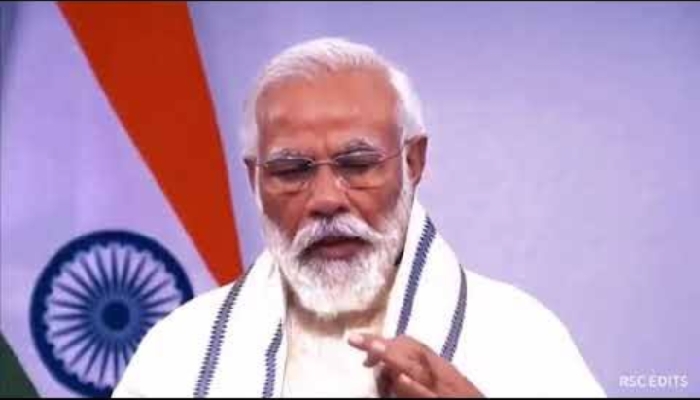Jammu, Jan 1: A day after PDP gave signs of apparent softening of stance towards it, BJP today said it has sought 'more time' from the governor in view of the ongoing dialogue with parties on government formation and hinted that it could relent on the issue of having chief minister from Jammu.
Governor has set January 19 deadline for formation of government in the state and BJP will not take any step in haste. The dialogue with other parties is on and people of the state will 'soon get good news', BJP's state unit chief Jugal Kishore Sharma today said after a party delegation met Jammu and Kashmir governor NN Vohra.
"We have asked him (governor) for some more time, so that the result of the ongoing dialogue (with other parties) comes out. There are many issues that need to be discussed that is why it is taking time," he said and asserted that BJP would work for a stable government in J&K.
Queried on the demand for a chief minister from Jammu region, party's state incharge Avinash Rai Khanna said, "Jammu, Kashmir and Ladakh constitute one state and the chief minister would be from the state of Jammu and Kashmir."
The BJP leadership in Jammu and Kashmir had been till now batting strongly for a chief minister from Jammu, especially from the party, in case of a post-poll alliance.
While hinting towards accommodating the agendas of coalition partners, Khanna said that the party knows very well how to run a 'successful coalition government.'
"When we sit together and discuss on the issue of government formation, we can come out with a Common Minimum Programme and form a joint agenda to run the government.
"BJP knows very well how to run a coalition government and the people trust us on that," Khanna said.
Sharma said the process of discussion with other parties was on. "The people of the state will soon get a good news on the formation of the government. We are working towards formation of stable government in the state," he said.
"We are not in a hurry (to form the government) we are working to give the people of Jammu and Kashmir a stable government that completes its tenure of six years," Sharma said.
Asked if the party was in touch with the leadership of either National Conference or the People's Democratic Pparty, Sharma said, "You know how many parties are there in the state. We can just say that the process is on and you will get the details in the days to come."
PDP leader Mehbooba Mufti yesterday met governor and dropped hints that her party is not averse to joining hands with BJP as she said the poll mandate was an "opportunity" for Prime Minister Narendra Modi and invoked Atal Bihari Vajpayee.
Without giving details of what exactly she discussed with Vohra, Mehbooba had said her meeting with the governor was "informal" in the wake of a "decisive but divided mandate" thrown up by the recent Assembly polls.
Answering questions over the issue of government formation, she told reporters that "PDP's priority is not to cobble up a majority for the sake of government formation."
Whatever formation is firmed up, it should respect the mandate of the people and have the principle of "reconciliation", she said, adding "till that is not taken along, forming any government will be useless".
Sharma said "Governor has told us that government in the state should be formed before January 19".
"J&K people have given BJP a mandate to form the government. Whatever government is formed, it should stable and last full six years.
"For formation stable government for six years, BJP will not take any decision in haste," Sharma said.
The Assembly elections threw up a fractured verdict with PDP emerging as the single largest party with 28 seats in the 87-member Assembly and BJP the second largest party with 25 seats.
National Conference won 15 seats and Congress 12. Smaller parties and independents together won seven seats.






Comments
Add new comment